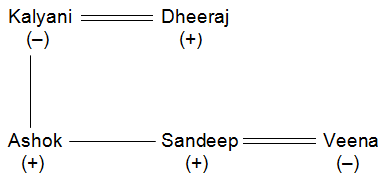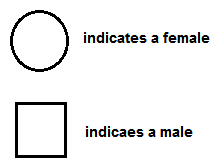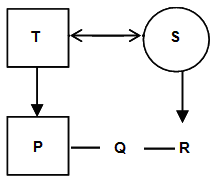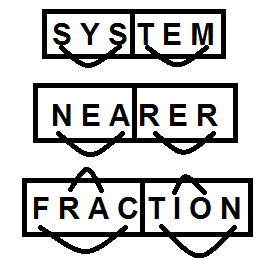SLAT Mock Test - 2 (New Pattern) - CLAT MCQ
30 Questions MCQ Test - SLAT Mock Test - 2 (New Pattern)
Directions: In this question, a number series is given with one term missing. Choose the correct alternative that will replace the question mark and complete the series.
3, 8, 13, 24, 41, ?
Directions: In the following question, a number series is given with one or more terms missing. Choose the correct alternative that will continue the same pattern and complete the series.
30, 24, 19, 15, 12, ___
The year after 1988 having the same calendar as that of 1988 is
Kalyani is the mother-in-law of Veena, who is the sister-in-law of Ashok. Dheeraj is the father of Sandeep, the only brother of Ashok. How is Kalyani related to Ashok?
P is the brother of Q and R. S is R's mother. T is P's father. Which of the following statements cannot be definitely true?
Directions: The following question consists of a pair of numbers that have a certain relationship to each other, followed by four other pairs of numbers given as alternatives. Select the pair in which the numbers are similarly related as in the given pair.
8 : 256
Select the related word/letters/number from the given alternatives.
Scientist : Laboratory : : Astronomer : ?
If SYSTEM is coded as SYSMET and NEARER as AENRER, then FRACTION will be coded as
Directions: The question consists of one or more than one principle and some facts. You are to examine the principle(s) and apply it/them to the given facts, and select the best option.
Principle: It can be a ground for divorce if the wife refuses to stay with in-laws.
Facts: Uma and Rajesh are married. Both have well-paying jobs, and they have been living with Rajesh's parents at their ancestral house for five years. Uma gets a promotion and is supposed to go out of town for three months for training. Rajesh's parents insist her to refuse the promotion and stay with them. Uma, who is very committed to her job, goes for the training. Rajesh files for the divorce on the ground of Uma's refusal to stay with her in-laws.
Decide.
Directions: The question consists of two statements, one labelled as Principle(s) and the other as Facts. You are to examine the Principle(s) and apply it to the given Facts carefully and select the best option.
Principles:
1. Article 18 of the Constitution of India provides that no title, not being a military or academic distinction shall be conferred by the state.
2. The Constitution of India says that no citizen of India shall accept any title from any foreign state without the prior consent of President.
Facts: Ministry of information and broadcasting of China instituted international awards in various categories of cinemas which were given in a gala ceremony held in Beijing. Joseph Kumar, a leading Tollywood actor and citizen of India, was awarded with the Award of Best International Actor. XYZ, an NGO, filed a writ petition against Joseph Kumar claiming that he violated the provisions of Indian Constitution by receiving award from China without the prior consent of President.
Decide.
Directions: The question consists of two statements, one labelled as Principle(s) and the other as Facts. You are to examine the Principle(s) and apply it/them to the given Facts carefully, and select the best option.
Principle: Evidence must be confined to matters in issue.
Facts: A robbery took place in a society where jewellery and cash worth Rs. 10 lakh were stolen from a house. The camera of the adjoining house captured the video prior and post robbery. The tape was shown as evidence to the police; but the police viewed and refused to accept it.
Decide.
Directions: The following question consists of two statements, one labelled as Assertion (A) and the other as Reason (R). You are to examine these two statements carefully and select the correct answer accordingly.
Assertion (A): Lok Sabha can be dissolved.
Reason (R): Members of Lok Sabha are elected by first-past-the-post (FPTP) system to represent their respective constituencies.
Directions: The question consists of two statements, one labelled as Principle(s) and the other as Facts. You are to examine the Principle(s) and apply it/them to the given Facts carefully, and select the best option.
Principle: Whoever abets any offence shall, if the act abetted is committed in consequence of the abetment, and no express provision is made by this Code for the punishment of such abetment, be punished with the punishment provided for the offence.
Facts: A instigates B to give false evidence. B, in consequence of the instigation, commits that offence.
Who is liable to punishment in this case?
Directions: The question consists of two statements, one labelled as Principle(s) and the other as Facts. You are to examine the Principle(s) and apply it/them to the given Facts carefully, and select the best option.
Principle: Whoever, intending to take dishonestly any moveable property out of the possession of any person without that person's consent, moves that property in order to such taking, is said to commit theft.
Facts: A cut down a tree on Z's ground, with the intention of dishonestly taking the tree out of Z's possession without Z's consent.
Decide whether any punishable act has been done or not.
Directions: The question consists of two statements, one labelled as Principle(s) and the other as Facts. You are to examine the Principle(s) and apply it/them to the given Facts carefully, and select the best option.
Principle: Mere silence as to the facts likely to affect the willingness of a person to enter into a contract is not a fraud, unless the circumstances of the case are such that, on close examination, it is found to be the duty of the person keeping silent to speak, or unless his silence is, in itself, equivalent to speech.
Facts: Ram sells by auction to Gagan a dog, which Ram knows to be of unsound state of mind. Ram says nothing to Gagan about the dog's unsound state of mind.
Directions: The question consists of two statements, one labelled as Principle(s) and the other as Facts. You are to examine the Principle(s) and apply it/them to the given Facts carefully, and select the best option.
Principle: The parties to a contract must either perform, or offer to perform, their respective promises, unless such performance is dispensed with or excused under the provisions of the Contract Act, or of any other law.
Facts: A promises to deliver goods to B on a certain day on payment of Rs. 1,000. A dies before that day. What would be the next step in this situation?
Decide.
Principle: Communication of offer and acceptance is must for a valid contract.
Facts: Tanuj proposes by courier to sell a television to Rahul at Rs. 10,000. Tanuj intimates revocation of his proposal, by an email after 6 hours, to Rahul due to unexpected fault in the working of the television.
State whether revocation of the offer is valid.
Directions: The question consists of one or more than one principle and some facts. You are to examine the principle(s) and apply it/them to the given facts, and select the best option.
Principle 1: A woman has equal share in her husband's property, not vice versa.
Principle 2: The property inherited cannot be dispersed with self-acquired property.
Facts: Pam was married to Jim. After one year of marriage, Pam inherited a manor (a large country house with lands) from her father. After 3 years of marriage, Jim and Pam divorced, and Jim claimed equal share in the inherited property of Pam.
Decide.
Directions: The question consists of two statements, one labelled as Principle(s) and the other as Facts. You are to examine the Principle(s) and apply it/them to the given Facts carefully, and select the best option.
Principle: If a document is alleged to be signed or to have been written wholly or in part by any person, the signature or the handwriting of so much of the document as is alleged to be in that person's handwriting must be proved to be in his handwriting.
Facts: There was a written sale agreement between two persons for sale of property, but the seller disagreed to the fact of giving any written proposal for sale.
Decide.
What is the maximum allowable tetrahydrocannabinol (THC) content for cannabis cultivated under the pilot study approved by the Himachal Pradesh Cabinet?
What is a significant consequence of inadequate crowd management at large events?
What is the primary function of an Enforcement Case Information Report (ECIR) as used by the Enforcement Directorate?
What significant discovery was made regarding amino acids in the samples from asteroid Bennu?
What is the primary significance of asteroid Bennu in relation to the early solar system?
What is a significant reason for the geopolitical importance of the Kurdistan Region?
What is the primary purpose of the e-Shram Microsite launched by the Union Minister for Labour & Employment?


















